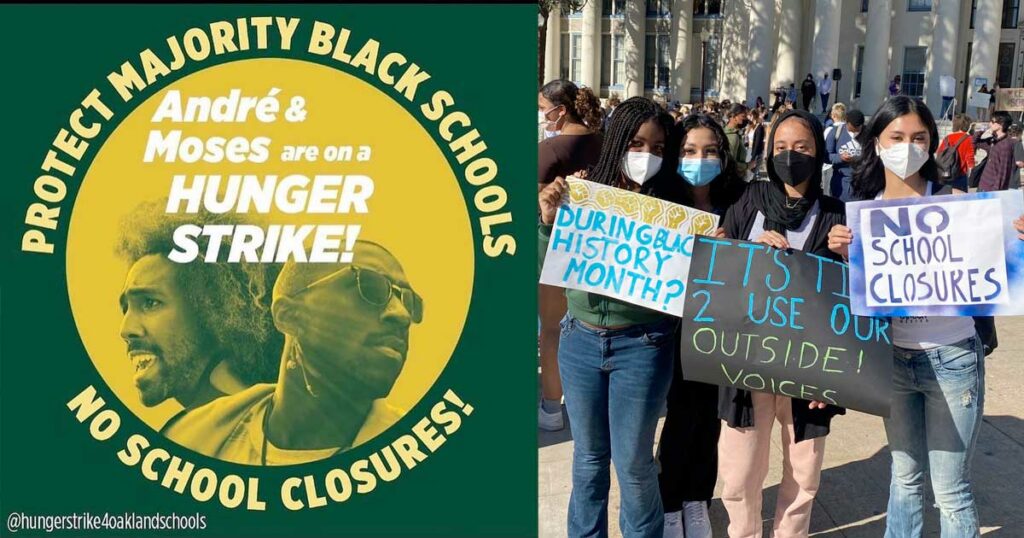Blog
Hungry for Justice: Parents, Students, and Educators Fight Against Oakland School Closures

Thursday marks the 17th day of a hunger strike in Oakland, CA. Two public school teachers, Andre San-Chez and Moses Omolade, began it as one part of a much larger campaign to resist the unprecedented closure and consolidation of eleven Oakland schools. The closure and consolidation plan will disproportionately affect low-income students of color. As Oaklandside reports: “Half of the schools at risk of closure have the highest percentage of Black student enrollment in the district.”
Last week, the board of the Oakland Unified School District voted for the school closures after an hours-long board meeting packed with community members speaking out against it. Why did the board vote against something their constituents so overwhelmingly opposed?
Last week’s vote has its roots in decisions made almost twenty years ago, ones that put the district in a financial bind that echoes the neoliberal structural adjustment programs imposed on places like Detroit, Puerto Rico, and dozens of nations in the Global South. As EdSource details:
- In 2003, the district went into state receivership after receiving a $100 million bailout in order to balance its budget amid a massive shortfall. Receivership essentially meant the district lost fiscal control until it was deemed to be in a more stable situation. Though the district still has not fully paid off the loan, control was given back to the district about five years later. The state-appointed a trustee with veto authority over the district’s financial decisions, who was replaced years later by a trustee appointed by the county.
- For years, Oakland city and state representatives have called on the state to forgive the remainder of the loan, to no avail.
- In 2018, the state offered to pay down a portion of Oakland Unified’s structural deficit under Assembly Bill 1840. At the time, the Department of Finance estimated the amount of state aid to be distributed to Oakland Unified over the course of three years to be $34.7 million. The district was only guaranteed that money, however, if it followed through with fiscal solvency plans that OUSD developed, which included closing schools and cutting staff positions.
- In recent months, the district has been under pressure by Alameda County Superintendent LK Monroe to follow through with the district’s previous plans to close schools.
Parents and students have testified that these school closures will make their commutes to school longer and more dangerous, an outcome is seen after similar closures in cities like Chicago, New York City, and Philadelphia.
While the vote is concluded, the fight to save Oakland schools isn’t. Students are planning more walkouts. Organizers are pushing state legislators to pass an emergency bill removing OUSD’s debt from the books, and community members are pushing for the board to reconsider the decision. On Tuesday, Oakland City Council unanimously passed a resolution against the school closures. At a moment when more funding is going into the public education system than ever before, parents, students, and educators are uniting against the return of austerity politics. As hunger striker Moses Omolade said in an interview last week:
“The school board is attempting to close predominantly Black and Brown schools without engaging us at all. So we are deciding to push back. We are deciding to make noise and to cry foul about the reasons in which they’re choosing to close our schools, because balancing the budget, especially when it’s only 2% of your budget, on Black and Brown bodies is not something that’s acceptable.”
OUSD Board Member Mike Hutchinson, one of the two to vote against the closures, said the day after the vote, “I hope you all are ready for this fight. It’s on, no holds barred, by any means necessary, we’re going to resist, and we will never let you close our schools.”
One thing about Oakland youth: THEY ORGANIZE. So proud of the Oakland Tech students who organized this protest against OUSD’s anti-Black school closures!!! pic.twitter.com/jDHv9PUHYD
— ray (@rayloviejones) February 11, 2022
The struggle against school closures in Oakland is part of a nationwide tapestry of community movements that have resisted privatization budget cuts, and built community schools in their place. Oakland’s most compelling analog would likely be the 2015 fight to save Dyett High School. Dyett was the last open-enrollment public school in Chicago’s historically Black neighborhood of Bronzeville, closed by then-Mayor Rahm Emanuel. In addition to an overwhelming response from the community, parents undertook what would become a 34-day hunger strike, which ended with the announcement of Dyett’s reopening. The Dyett victory was a bright spot in a decade of tragic, racially-disproportionate school closures in cities across the country, and served as one of the sparks that ignited the vibrant education justice movement we see today. Learn more about the Dyett hunger strike here.
Decisions are only final if the people accept them as such. Generations of organizing for quality public schools contain the hard lessons and inspiration communities need now to forge a better future for our children. It’s up to us to commit to the work and see it through.


